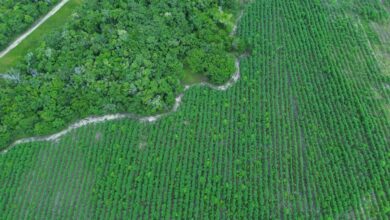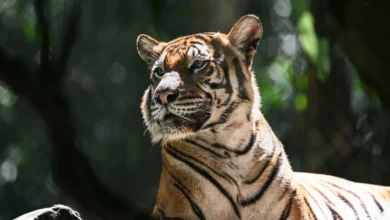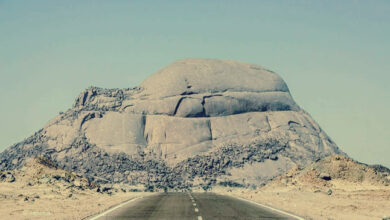Less than a century ago, it was common to see vultures flying over Cairo and nesting in some of the city’s buildings. Today, the vulture population in Egypt is drastically declining due to various threats.
Six species of vultures are recorded in Egypt today, even though some are quite rare and seldom spotted. One such species is the "bearded vulture", which is a rare resident of the mountains of the Eastern Desert and Southern Sinai. This big travelling bird has the particuliarity of dropping from great heights the bones it gathers from carcasses, thus breaking them and accessing the marrow inside the bone.
The "Egyptian vulture" is one of the most common in Egypt, while the "griffon vulture" has become scarce, just like the "Rüppell’s vulture" which is considered a rarity.
The "lappet-faced vulture", which used to be seen in the country’s desert areas is now mostly found in the southeastern part of the Eastern Desert, and is considered "rare". Finally, the sixth species, the "black vulture", has also become uncommon.
These six species of vulture found in Egypt have declined significantly, according to Mindy Baha al-Din, who is a bird specialist with the non-governmental organization Nature Conservation Egypt (NCE). Although no recent study has been conducted to determine the exact size of the vulture population in Egypt, she is adamant that there has been a massive decline.
“One of the main threats that is endangering these birds is the secondary poisoning that occurs when the vulture feeds on an animal carcass like a stray dog or cat which has been poisoned by humans," she says.
According to Baha al-Din, farmers use pesticides to get rid of pests, and have a tendency to use poison indiscriminately, with often fatal consequences for these scavengers.
Researchers from Europe have equipped some of the migratory vultures with transmitters to be able to monitor where they are going. “When these transmitters stop beeping, it means that the bird is dead, then we can localize it and try to figure out what caused its death. And in doing so, we have a more comprehensive idea of the major threats against the population,” she says.
“The rarefaction of wild animals like gazelles, on which vultures traditionally feed, is also causing their decline, coupled with the fact that camel caravans no longer pass from Sudan to Egypt, depriving the vultures of an importance source of food,” continues Baha al-Din.
Electrocution when colliding with power lines is also killing many of these birds, along with collisions with windmills.
Vultures also feed on rubbish dumps and absorb hazardous material that can cause their death, and Baha al-Din believes that “there should be a proper waste collection system that would separate this hazardous matrials from the rest in order to avoid poisoning these birds.”
Egypt’s rich and varied wildlife is also threatened, to a lesser extent, by Maltese hunters who practice indiscriminate hunting in one of Egypt’s biggest National Park, Gebel Elba. A park ranger from the Egyptian Environmental Affairs Agency (EEAA) declared last year that Maltese poachers were caught with two lappet-faced vultures and other birds at Bir Shalatin, although access to the park is controlled.
Baha al-Din, who is well aware of the Maltese poachers' story, explains that these hunters kill birds and mammals indiscriminately, before smuggling them out of the country to add them to their private stuffed animals collection.
“The authorities should really try harder to stop these poachers from entering the protected zones,” she says vehemently.
Little of a concrete nature has been done to protect Egypt’s vultures so far, aside from the creation years ago of a “feeding station” or “vultures’ restaurant” close to Shalateen.
Mohamed Gad, who used to be the manager of the Gebel Elba National Park, explains that this feeding station, visited by eco-tourists, was created “to give vultures a safe access to uncontaminated carcasses that are brought from the nearby camel market of Shalateen.”




